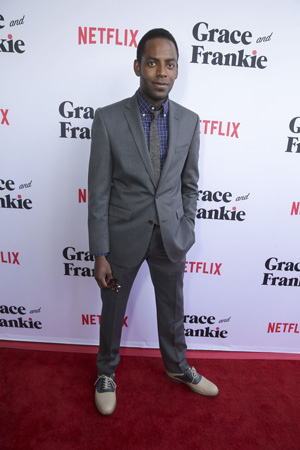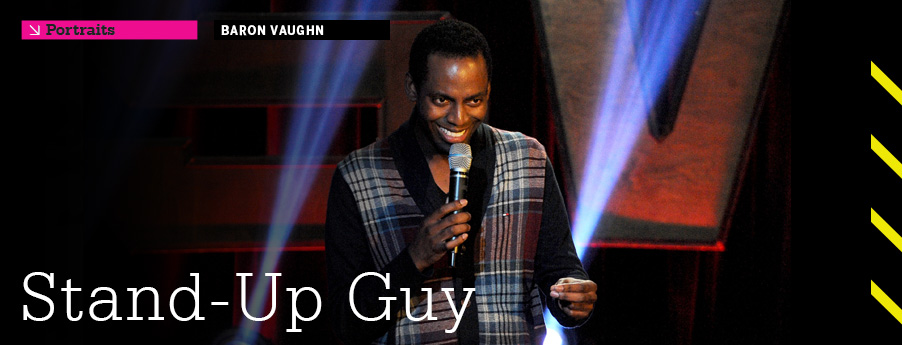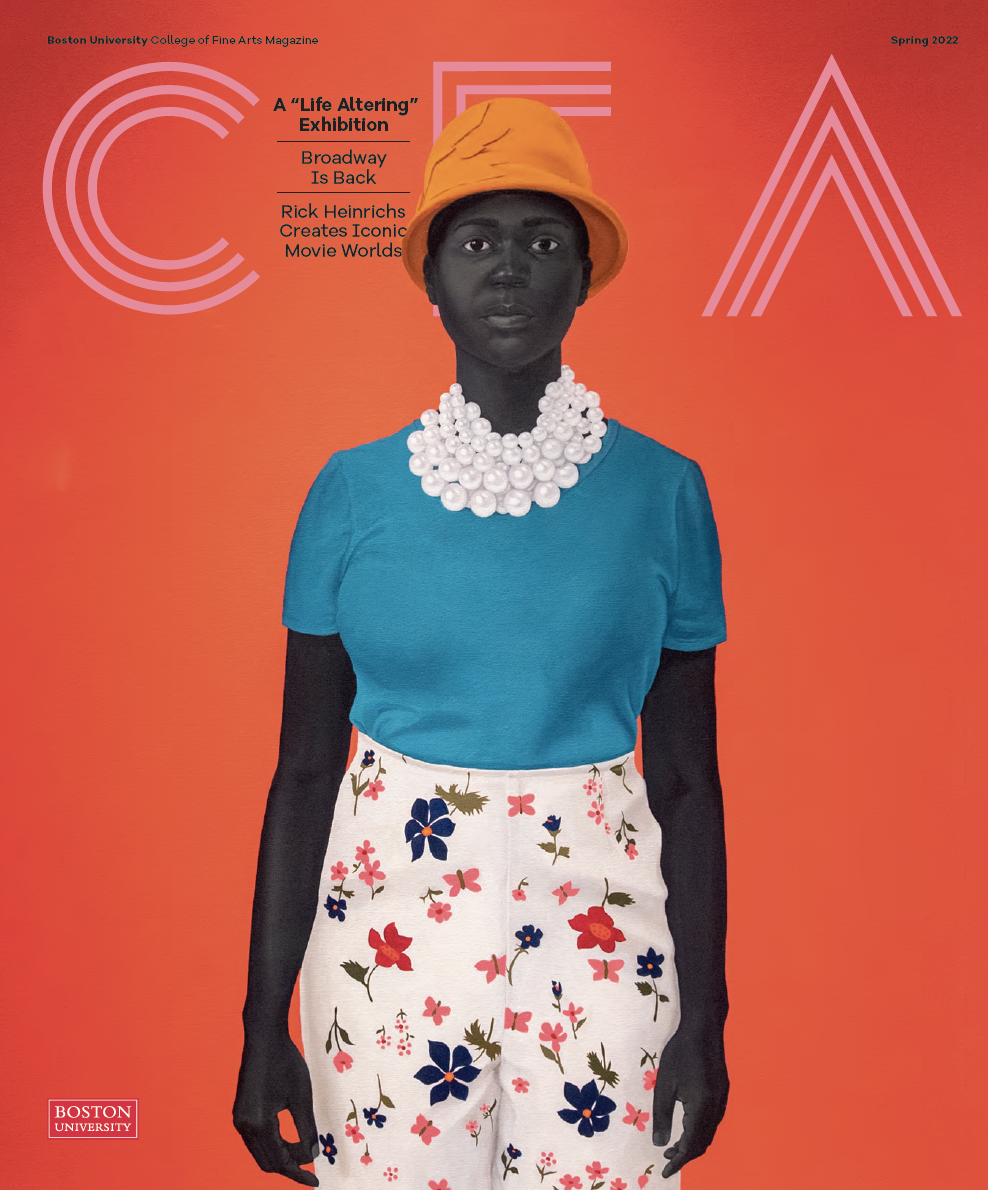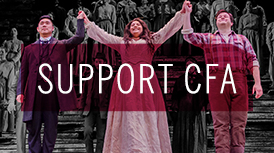Baron Vaughn Uses Comedy to Dig Deep
Baron Vaughn of Grace and Frankie uses comedy to dig deep
By Corinne Steinbrenner
Banner image: In March 2016, actor and comedian Baron Vaughn (’03) performed at SXSW Comedy during the 2016 SXSW Music, Film + Interactive Festival at The North Door in Austin, Texas. Jealex Photo/Getty Images Entertainment/Getty Images
Baron Vaughn’s list of current projects is as long as it is impressive. Vaughn (’03), an acting major, plays Frankie’s adopted son, Nwabudike “Bud” Bergstein in the hit Netflix series Grace and Frankie. He’s also producing and hosting the Comedy Central show, The New Negroes. This year’s revival of the cult classic Mystery Science Theater 3000 features his writing and voice acting. Fatherless, Vaughn’s documentary about meeting his father for the first time at age 35, recently aired on the Fusion Channel. His second comedy album, Blaxistential Crisis, is available on iTunes.

Among many other projects, Baron Vaughn (’03) appears in the hit Netflix series Grace and Frankie, produces and hosts The New Negroes on Comedy Central, and released two comedy albums. Eric Charbonneau/Invision for Netflix/AP Images
While the variety of these undertakings reflects Vaughn’s wide-ranging skills, the projects are united by his sharp-witted humor. Even the documentary, with its ostensibly sober subject matter, elicits more laughter than tears.
“Humor is the number-one way that I process things,” says Vaughn. “There are a lot of people who are funny who use humor as a deflection device, but I use it as a drill to go deeper into things.”
Vaughn gravitated to stand-up comedy at an early age. The monologue he delivered at his first acting audition—which earned him entrance to Las Vegas’ magnet arts high school—was structured like a stand-up routine. “It was something about how I was at an age where I was too old for some things but too young for other things,” Vaughn recalls. “It set up a thesis, and then all the things that supported it were essentially jokes. I guess that’s why I was attracted to it.”
Vaughn first performed his own stand-up material as a college student in Boston, appearing on open mic night at Dick Doherty’s Beantown Comedy Club. “It was a two-person bringer,” he says: in order to be allowed on stage, he had to bring along two people willing to pay the show’s $7 cover. “All of my friends were college students, so that was very difficult to organize,” he says. “It was basically, ‘I can either see Baron tonight or eat a sandwich. Hmm. Decision made. One burger, please.’”
After graduating from CFA, Vaughn moved to New York to pursue acting and comedy, both of which he loves, but for different reasons. While acting offers the joy of collaborating with fellow actors, stand-up affords him full control of his subject matter and its delivery. “I get to take people on a ride,” he says of stand-up.
“Humor is the number-one way that I process things. There are a lot of people who are funny who use humor as a deflection device, but I use it as a drill to go deeper into things.”—Baron Vaughn (’03)
Vaughn honed his stand-up skills performing hour-long comedy shows at colleges throughout the country. His stage presence and jokes about familiar subjects—parents, dating, cable TV—made him a popular act from Vassar to UConn to Appalachian State.
“Colleges were my bread and butter for four or five years,” Vaughn says, “and then as I got older, I started talking more about life—like rent and bills and trying to actually be in a relationship—stuff that college students couldn’t really relate to. They wanted more high-energy stuff that was silly, which I do, but now I wrap that around a perspective.”
Today Vaughn lives in Los Angeles and travels the country to appear at comedy clubs and festivals. His latest comedy album showcases his love of puns and his theatrical style. He breaks into song mid-sentence. He chirps like the crickets who’ve invaded his apartment. He meows “The Imperial March.” Vaughn calls himself a kitchen-sink comedian, “meaning that I throw everything at you, including the kitchen sink,” he says. “I use everything that’s at my disposal in my act. I use the fact that I can do characters, act, do different voices and accents, do interesting things with my body, do sound effects.”

In the hit Netflix series Grace and Frankie, Vaughn (right) plays Nwabudike “Bud” Bergstein, adopted son of Frankie and her former husband, Sol (Sam Waterston, left). Melissa Moseley/Netflix
The sillier segments of the album balance out more serious bits about defaulting on his student loans and developing a life-threatening allergy to dairy. He told a version of the allergy joke during a recent Comedy Central appearance: “I’m actually going to stop calling my allergies that because it’s a wimpy name for something that might kill you out of nowhere. So I’m now going to call my allergies my police.”
Vaughn says he tackles thorny subjects like racism, gun violence, and his own intimacy issues because he’s interested in the “whys of humanity” and the whys of himself. “Essentially, all stand-up comedy is, ‘Why do people do things?’,” he says.
When he drills into a particular human behavior to discover its core, what he finds there often leaves him shaking his head, he says, and thinking, “That is silly.” In that absurdity, he finds comedy.
By exploring serious subjects on stage, Vaughn hopes to give audience members permission to delve deeper themselves. “It’s not that I want to tell people what to think,” he says, “as much as I want to tell people it’s okay to think, and it’s okay to apply those thoughts to your life, and ask questions, and to say what you feel, and express your fears.” And it’s okay to laugh at yourself in the process.










